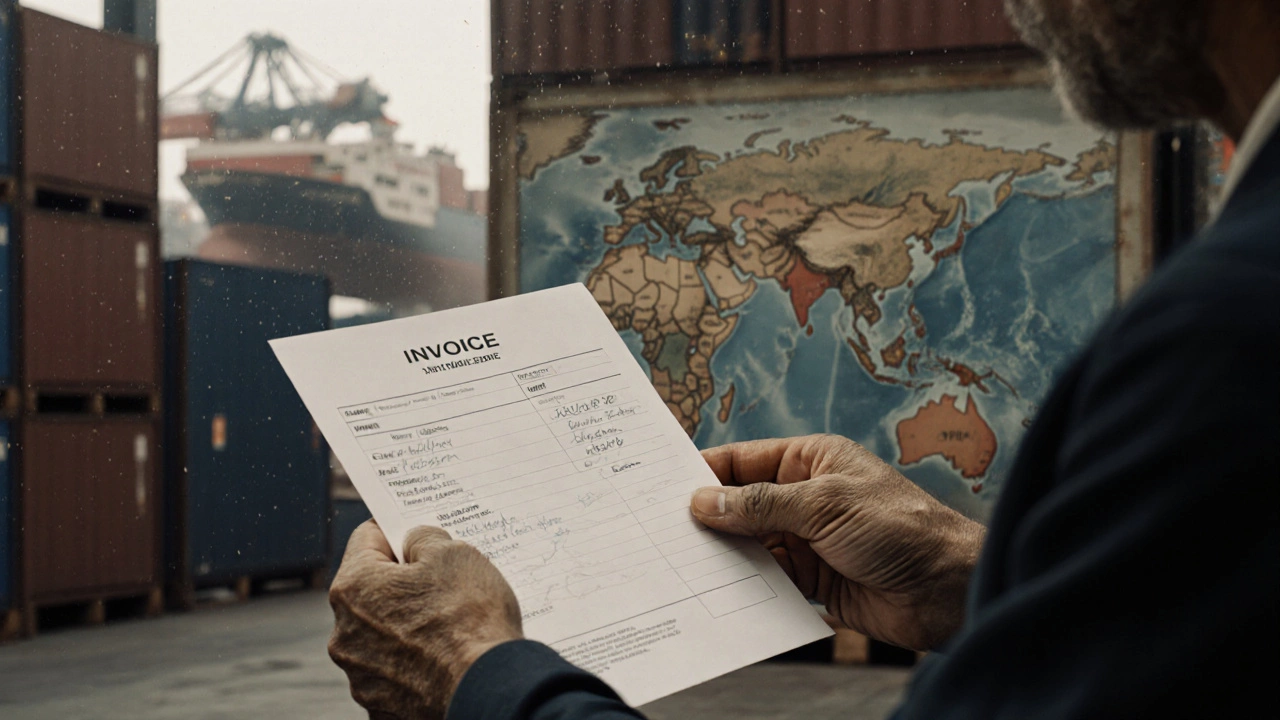Freight forwarding isn’t something you learn from a textbook. It’s not a certification you get after a three-day course. It’s not even a job title that automatically means you know what you’re doing. So is freight forwarding a skill? The short answer: yes-but not the kind you can check off a list. It’s a mix of experience, instinct, and relentless problem-solving that only comes from moving real cargo through real chaos.
What Freight Forwarding Actually Does
At its core, freight forwarding is about getting goods from point A to point B across borders. Sounds simple, right? But here’s what that really means: you’re juggling customs rules in 15 different countries, tracking a container that got stuck in a port strike, negotiating with three different trucking companies because one went bankrupt, and calming down a client whose $50,000 shipment is three days late because of a paperwork error in Manila.
Freight forwarders don’t own ships or planes. They don’t even own warehouses. What they own is knowledge. They know which customs broker in Singapore will fast-track your documents for a $200 fee. They know that a shipment from Guangzhou to Rotterdam might be delayed if it hits the port during monsoon season. They know that a mislabeled Harmonized System code can hold up a whole pallet for weeks-and cost you thousands in demurrage fees.
This isn’t logistics theory. This is logistics in motion. And it’s messy.
The Hidden Skills Behind the Job
If you think freight forwarding is just filling out forms, you’re missing half the picture. Here’s what actually matters:
- Language fluency-not just English. You need to understand basic phrases in Mandarin, Spanish, or Arabic to talk to a warehouse manager who doesn’t speak your language. A single mistranslated word on a commercial invoice can trigger a customs hold.
- Pattern recognition-you start noticing that certain ports always delay shipments on Fridays. Or that a specific airline in Turkey always loses documents if the weather’s below 5°C. These aren’t in manuals. You learn them the hard way.
- Negotiation under pressure-when a client’s product launch is in 48 hours and their container is stuck in Dubai, you don’t ask for a meeting. You call every carrier, customs agent, and local agent you know until one says yes.
- Attention to detail with zero room for error-one wrong digit in a bill of lading number, and your shipment gets rerouted to the wrong country. No one notices until it’s too late.
- Stress tolerance-you work 14-hour days during peak season. You get calls at 2 a.m. because a shipment was seized. You apologize to clients for problems you didn’t cause. And you still show up the next day.
These aren’t job requirements listed on a LinkedIn post. These are survival skills. And they’re not taught in school.
Why Certifications Don’t Make You a Freight Forwarder
There are plenty of courses out there: Certified International Freight Forwarder, Customs Broker License, Supply Chain Professional. They’re useful. But they’re like getting a driver’s license and thinking you can win the Daytona 500.
A certification teaches you the rules. But in freight forwarding, the rules change every week. A new tariff hits. A port closes. A country bans a type of packaging. A carrier raises rates overnight. No course prepares you for that.
I’ve seen people with three certifications struggle to book a simple shipment from Toronto to Berlin. Meanwhile, a 25-year-old who started as a warehouse clerk in Vancouver can handle a 40-foot container of medical equipment to Nairobi because she’s spent three years learning how the system actually works-not how it’s supposed to work.
Knowledge is necessary. But experience is everything.

Real Examples: Skills in Action
Here’s what this looks like in the real world:
- A client in Toronto needs to ship 12 pallets of organic coffee beans to Germany. The beans are labeled as "food-grade," but the customs form says "dry goods." That’s a red flag. A rookie might not notice. An experienced forwarder knows German customs flag "food-grade" shipments for inspection-and that inspection takes 72 hours. They re-label the paperwork, add a phytosanitary certificate, and get the shipment through in 48 hours.
- A shipment from Vietnam to Chicago gets stuck because the airline lost the airway bill. The forwarder doesn’t wait for the airline to fix it. They track down the original copy from the factory, scan it, email it to customs, and call the airport’s cargo supervisor directly. The shipment clears in 10 hours.
- A company in Montreal ships industrial machinery to Brazil. The Brazilian customs authority requires a specific form signed by a local chamber of commerce. The forwarder doesn’t just mail it-they call a contact in São Paulo who works at the chamber, gets the form signed the same day, and arranges a courier pickup before the office closes.
These aren’t lucky breaks. They’re the result of years of building relationships, learning patterns, and knowing who to call when things go wrong.
Who Becomes Good at Freight Forwarding?
It’s not who you think.
You won’t find most top freight forwarders with MBA degrees. You’ll find them in warehouses, at ports, on loading docks. They’re the ones who started as clerks, then drivers, then coordinators. They didn’t get promoted because they had the right degree. They got promoted because they solved problems no one else could.
They’re the people who remember that a client in Poland always needs shipments delivered on Tuesdays because their warehouse closes on Mondays. They know that a shipment to Chile can’t leave on a Friday because the customs office shuts down early. They’ve memorized the names of the three customs brokers in Miami who still use fax machines-and they know which one still answers after 6 p.m.
This isn’t a career for people who want structure. It’s for people who thrive in chaos.

Can You Learn It? Yes. But Not the Way You Think
Can you learn freight forwarding? Absolutely. But not by watching videos or reading PDFs. You learn it by doing it. By making mistakes. By losing shipments. By apologizing to clients. By staying up until 3 a.m. fixing a mistake you didn’t even know you made.
The best way to start? Get a job as a logistics coordinator at a small forwarder. Not a big name. Not a tech startup. A small company that handles 20 shipments a week. You’ll see everything: the paperwork, the delays, the angry emails, the last-minute changes. You’ll learn how the system cracks-and how to patch it.
After six months, you’ll start noticing patterns. After a year, you’ll be the person everyone calls when something breaks. After two years, you’ll be the one who knows how to fix it.
Freight Forwarding Is a Skill-But It’s Not a Job Title
Freight forwarding isn’t a skill you get from a course. It’s a skill you earn through repetition, failure, and persistence. It’s the ability to turn confusion into clarity. To find a solution when everyone says it’s impossible. To make a 14-hour flight feel worth it because you got a shipment through on time.
It’s not glamorous. It’s not listed in any "top 10 high-paying jobs" article. But it’s one of the most critical skills in global trade.
If you’re wondering whether you can do it-ask yourself this: Do you like solving puzzles no one else can figure out? Do you get satisfaction from making things work when the system says they can’t? If yes, then freight forwarding isn’t just a skill. It’s your calling.
Is freight forwarding a good career choice?
Yes-if you’re okay with high stress, irregular hours, and constant change. The pay is decent, especially after a few years of experience, and demand is growing as global trade expands. But it’s not a 9-to-5 job. You’ll work weekends during peak season, answer calls at night, and deal with angry clients. If you like solving real-world problems under pressure, it’s one of the most rewarding logistics roles out there.
Do you need a degree to become a freight forwarder?
No. A degree in logistics or supply chain management helps, but it’s not required. Many successful forwarders started with no college education. What matters is hands-on experience. Employers care more about your ability to fix a delayed shipment than your GPA. Certifications like the Certified International Freight Forwarder can give you a boost, but real skills come from working in the field.
What’s the biggest mistake new freight forwarders make?
Assuming the system works the way it’s supposed to. Newcomers often rely on manuals, software, or official guidelines-and get blindsided when real-world rules don’t match. For example, a customs form might say "one signature required," but in practice, the port in Lagos demands three. The best forwarders learn to read between the lines and build relationships with local agents who know the unwritten rules.
How long does it take to become good at freight forwarding?
It takes about 18 to 24 months to become reliable. You’ll make mistakes in the first six months-misfiled documents, missed deadlines, miscommunication. By year one, you’ll start recognizing patterns. By year two, you’ll be the person others turn to when things go wrong. Mastery takes years, but competence comes faster than most expect.
Can AI replace freight forwarders?
Not anytime soon. AI can automate booking, track shipments, and flag paperwork errors. But it can’t negotiate with a port official who’s refusing a shipment because of a language barrier. It can’t call a contact in Mumbai at 3 a.m. to get a document signed. It can’t read between the lines of a customs notice written in broken English. Human judgment, relationships, and adaptability are still irreplaceable in freight forwarding.





